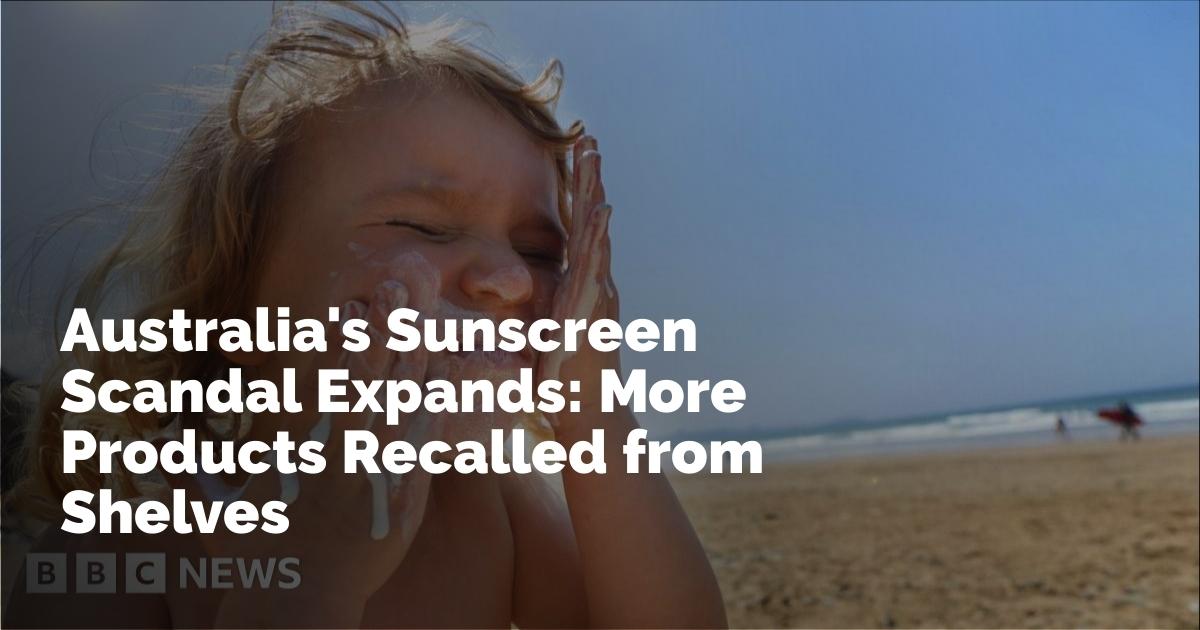Australia, often hailed for its robust sunscreen regulations, finds itself embroiled in a growing sunscreen scandal. As the country grapples with alarming revelations about sunscreen efficacy, consumers are left questioning the safety and reliability of these indispensable products. This unfolding controversy underscores broader concerns within the global sunscreen market, with potential implications that extend far beyond Australian shores.
Understanding the scope and impact of this scandal involves examining the recent findings, regulatory responses, and the larger ramifications for consumers and the skincare industry.
Safety Concerns Unmasked: The Initial Findings
The Australian sunscreen market has been shaken by findings from a prominent consumer advocacy group that tested various popular sunscreen brands. This investigation, conducted in June, discovered that several high-end sunscreens failed to provide the sun protection level advertised on their labels. For instance, the Ultra Violette's Lean Screen Skinscreen, which was supposed to offer SPF 50+ protection, shockingly returned an SPF of just 4, prompting a voluntary recall.
The scope of the issue widened considerably when the Therapeutic Goods Administration (TGA), Australia’s medicines regulator, flagged approximately 20 more sunscreen products. These products bear the same base formulation and yield significantly lower SPF ratings than claimed, with some as low as an SPF of 4.
Unpacking the Recall: Products and Manufacturers
The TGA's findings led to a substantial recall effort. Of the 21 products identified, eight have been withdrawn from the market or have had their production halted entirely. Sales of an additional ten products have been paused, pending further investigation, while two are currently under review. Interestingly, one of the scrutinized products is manufactured within Australia but is not available for purchase in the domestic market.
A significant factor in this development is the reliance on a singular base formula, produced by Wild Child Laboratories Pty Ltd, for several products now recalled. Addressing the unfolding situation, the company ceased the production of this formula. Tom Curnow, head of Wild Child Laboratories, emphasized that these discrepancies are indicative of a wider industry problem rather than isolated manufacturing faults at their facility.
Investigating Testing Integrity: The Role of PCR Corp
Central to the controversy is the scrutiny of the testing processes, particularly those conducted by Princeton Consumer Research Corp (PCR Corp), a laboratory based in the United States. The TGA has voiced substantial concerns regarding the integrity and reliability of SPF testing conducted by this lab, noting that many companies had relied on PCR Corp’s results to substantiate their SPF claims.
Despite the TGA’s communication with PCR Corp expressing their apprehensions, the lab has yet to issue a response. In a statement to the media, PCR Corp defended its testing methodologies, attributing inconsistencies to factors external to laboratory conditions. These include the variability in manufacturing processes, differences in raw materials, packaging and storage conditions, product age, and how products are handled once in the market.
PCR Corp highlighted that laboratory testing is inherently a snapshot of the specific sample used at the time, contributing to potential discrepancies when those results are compared against others conducted at different times or under different conditions.
Australia's Alarming Skin Cancer Statistics: The Need for Vigilance
Amid this crisis, it is crucial to consider Australia’s status as the country with the highest global rate of skin cancer. Statistics suggest that two-thirds of Australians are likely to face a skin cancer diagnosis in their lifetime, illustrating a dire need for effective sun protection. This underscores the importance of stringent sunscreen efficacy and reliability, given their pivotal role in preventing skin damage caused by ultraviolet (UV) radiation.
Currently, Australia boasts some of the most robust sunscreen regulations in the world. However, the revelations from the TGA’s investigations have highlighted potential gaps in testing and quality assurance that necessitate immediate attention.
Global Implications: The Broader Impact on the Sunscreen Industry
The fallout from these findings is not likely to remain confined to Australia’s shores. As companies worldwide often source ingredients and conduct testing through international labs similar to PCR Corp, global consumers and regulators may initiate a reevaluation of confidence in sunscreen testing and efficacy claims.
This scandal has sparked a broader conversation about the methods used to verify sunscreen effectiveness. The TGA itself has noted the "highly subjective" nature of existing testing requirements and is considering revising these standards to mitigate future discrepancies.
Given the international nature of the sunscreen supply chain, experts warn that similar issues may exist elsewhere, necessitating a global effort to standardize and improve testing protocols.
The Consumer Backlash
Consumer response to the scandal has been swift and critical. With trust in sunscreen brands eroded, there is growing demand for greater transparency and assurance from manufacturers. Many consumers are now questioning the efficacy of their sunscreens and reconsidering their options for skin protection amid Australia’s unforgiving sun.
For brands implicated in the scandal, the priority must be to regain consumer trust by ensuring that corrective measures are not only implemented but are also communicated effectively and transparently to the public. Reestablishing credibility will likely involve demonstrating a commitment to improved testing procedures, robust quality assurance processes, and accountability for past mistakes.
Conclusion: Navigating the Road Ahead for Sunscreen Safety
Australia’s unfolding sunscreen scandal serves as a timely reminder of the critical need for integrity and transparency in products designed to safeguard public health. As consumers and regulators around the world closely watch the developments in Australia, the broader industry faces the challenge of ensuring rigorous testing standards and restoring consumer confidence.
How the involved parties address these issues could set a precedent for sunscreen manufacturing and regulation globally. With skin cancer prevention hinging on effective sun protection, the resolution of this scandal bears significant weight on public health outcomes, underscoring its importance as an international issue of concern.
출처 : Original Source

